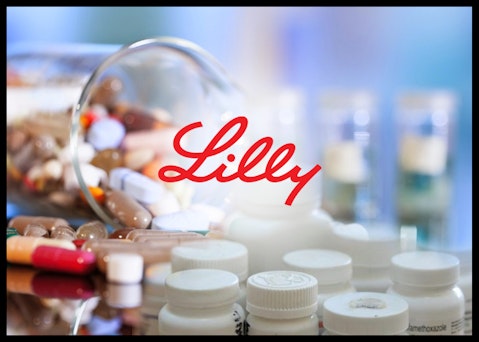We recently compiled a list of the 10 Most Promising Growth Stocks According to Hedge Funds. In this article, we are going to take a look at where Eli Lilly and Company (NYSE:LLY) stands against the other Most Promising Growth Stock According to Hedge Funds.
Bull Market and Investor Sentiment
Investors had been anxiously anticipating the start of a bull market, which the S&P 500 confirmed earlier this year. The bull run has seen the market continue to rise to new record highs, supporting revenue and earnings growth across the board.
Fast forward, the upward momentum appears to have peaked, with market indices at record highs. While it was highly expected that stocks would explode on the Federal Reserve offering support to a struggling economy with interest rate cuts, that has not been the case.
READ ALSO: David Einhorn Stock Portfolio: Top 10 Stocks to Buy and 7 Best Nanotech Penny Stocks to Buy.
It’s become increasingly clear that investors have become more sensitive to growth scares as the global economy faces many issues. Top on the list is the rising geopolitical tensions in the Middle East that threaten to disrupt supply chain networks. Energy prices rising owing to the escalation of a full-blown war could trigger higher inflation, something that is unsettling the markets.
Analysts at UBS are already warning investors that they should get overweight on defensive names as global growth slows at the back of deteriorating fundamentals. While UBS doesn’t anticipate a severe downturn, the bank is cautious, advising its clients to focus on important sectors like utilities and pharmaceuticals, which always outperform in a downturn.
While investors are increasingly rotating into defensive plays amid concerns about geopolitical tensions and the slowing global economy, Morgan Stanley Investment Management’s Andrew Slimmon recommends against this strategy.
“Now is the time to just be cautious. Don’t chase the defensives that are working because I think when we get to the fourth quarter, that won’t work,” the portfolio manager told CNBC’s “The Exchange.
“While our expectation is for October to remain choppy, we don’t view the overall market action to be bearish and encourage investors to maintain perspective on the longer-term trends,” Robert Sluymer, technical strategist at RBC Wealth Management, wrote to clients.
The sentiments echo the need to focus on high-growth companies. Investors who diversify their portfolio into high-growth companies eventually earn great returns regardless of how much a stock rises or falls in the short term.
Analysts project that S&P 500 stocks will grow at a median annual EPS rate of 8.5% over the next five years. On the other hand, the best growth stocks are well poised to outperform this benchmark by a factor of two to three or more.
For starters, companies exposed to artificial intelligence spectacles or those leveraging technology continue to deliver record earnings and revenue growth, thus dominating most hedge fund portfolios. Additionally, the most promising growth stocks, according to hedge funds, are those whose core business would be positively impacted by improving consumer purchasing power. As the Fed steers the economy into a soft landing, consumer purchasing is expected to improve, benefiting consumer cyclical stocks. Moreover, the rate cuts will likely benefit growth and tech stocks as well.
Market fluctuations are inevitable, but the secret to a growth stock’s success lies in the robustness of its core operations. Regardless of whether a stock is rising or falling in the short term, if you consistently invest in a competitively solid business, you’ll eventually reap substantial rewards.

Pixabay/Public Domain
Our Methodology
To compile the list of the most promising growth stocks according to hedge funds, we sifted through ETFs and online rankings to find 30 popular growth stocks. Then we selected the 10 that were the most widely held by hedge funds, as of Q2 2024. Finally, we ranked the stocks in ascending order of the number of hedge funds that have stakes in them.
At Insider Monkey, we are obsessed with the stocks that hedge funds pile into. The reason is simple: our research has shown that we can outperform the market by imitating the top stock picks of the best hedge funds. Our quarterly newsletter’s strategy selects 14 small-cap and large-cap stocks every quarter and has returned 275% since May 2014, beating its benchmark by 150 percentage points (see more details here).
Eli Lilly and Company (NYSE:LLY)
Number of Hedge Fund Holders: 100
Eli Lilly and Company (NYSE:LLY) stands out as one of the best growth stocks in the healthcare sector owing to the vast sales potential for weight loss treatments. It is one of the biggest players in the industry, backed by the blockbuster drug Tirzepatide, which has been approved for treating obesity.
While Eli Lilly and Company (NYSE:LLY) generated $1.2 billion in sales from Zepbound in the second quarter, it is also working on other next-generation candidates that should strengthen its prospects in the industry. Mounjaro is another flagship weight loss drug cementing the company’s prospects, generating $3.1 in sales in the second quarter.
The two drugs, Mounjaro and Zepbound, sold under Tirzepatide, can generate as much as $25 billion in peak sales, allowing the company to generate significant shareholder value.
Thanks to strong demand for weight loss drugs, Eli Lilly and Company (NYSE:LLY) posted a 36% year-over-year increase in second-quarter revenue totaling $11.3 billion. Its net income totaled $3.5 billion, 86% higher than in Q2 2023.
LLY is already looking into the future as it proceeds with the development of orforglipron and retatrutide, which are projected to bring in more than $1 billion in revenue annually by the year 2030. Furthermore, the company is in the process of gaining regulatory approval for its once-weekly insulin medication, which could be ready within the next couple of years.
Eli Lilly and Company (NYSE:LLY) also recently achieved a significant regulatory milestone with the FDA’s approval of Kisunla, known by its generic name donanemab, as a treatment for Alzheimer’s disease.
While the company pays a partial 0.58% dividend yield, it is essential to note that it has increased by 101.6% over the past five years. Consequently, as the company generates more revenues from its weight loss drugs, it should pay more dividends. Eli Lilly and Company (NYSE:LLY) is rated as a Buy on Wall Street with an average price target of $1,050.65, implying a 14.02% upside potential from current levels.
Eli Lilly and Company (NYSE:LLY) was a part of 100 hedge fund portfolios at the end of Q2 2024, down from 109 in the previous quarter, as per Insider Monkey’s database. Fisher Asset Management owned the largest stake in the company, worth over $4.4 billion.
Here is what PGIM Jennison Health Sciences Fund said about Eli Lilly and Company (NYSE:LLY) in its Q2 2024 investor letter:
“Eli Lilly and Company (NYSE:LLY) is a diversified biopharmaceutical company with core franchises in Diabetes, Obesity, Immunology, Neurodegeneration, and Oncology. The company is one of the two global leaders in diabetes with blockbuster products in Trulicity and recently launched Mounjaro (tirzepatide) to serve this large underserved market. To date, the Mounjaro launch is the strongest for any diabetes drug ever launched, which we attribute to off label usage in the obesity indication as well as on label use in diabetes. We believe the tirzepatide (the generic name for Mounjaro) franchise is also uniquely positioned to grow substantially from here thanks to its recent approval for obesity. To that note, in late 2023, Eli Lilly received approval for tirzepatide in obesity and is commercializing it for obesity under a new brand name, Zepbound. While still early in the launch, uptake has been extremely strong, exceeding that of both Wegovy and Mounjaro at the same timepoint in their launches. While Alzheimer’s Disease has been a tough market for drug developers, Eli Lilly has breakthrough designation from the food and drug administration (FDA) for donanemab and recently presented Phase III pivotal trial data that positions donanemab as the most efficacious drug in the class. In June, the FDA advisory committee voted unanimously in favor of donanemab as an effective treatment where the benefits outweigh the risks, praising the therapy as innovative. Donanemab was then approved under the brand name Kisunla in early July. Eli Lilly also has exciting franchises in dermatology, immunology, and oncology that are starting to add meaningfully to growth. With a proven history of strong commercial execution and one of the highest research and development (R&D) success rates in the industry, we see opportunity for continued success. With a lack of meaningful patent expirations for the rest of the decade. Eli Lilly is uniquely positioned amongst its larger-cap peers. Recent positive performance has been driven by the continued strong growth of Mounjaro and Zepbound, which led to a big guidance raise on the 1Q call, an unusual action for Eli Lilly this early in the year, which speaks to their confidence in the strong trends they are seeing.”
Overall LLY ranks 8th on our list of 10 Most Promising Growth Stocks According to Hedge Funds. While we acknowledge the potential of LLY as an investment, our conviction lies in the belief that AI stocks hold greater promise for delivering higher returns, and doing so within a shorter timeframe. If you are looking for an AI stock that is more promising than LLY, check out our report about the cheapest AI stock.
READ NEXT: $30 Trillion Opportunity: 15 Best Humanoid Robot Stocks to Buy According to Morgan Stanley and Jim Cramer Says NVIDIA ‘Has Become A Wasteland’.
Disclosure: None. This article is originally published at Insider Monkey.





